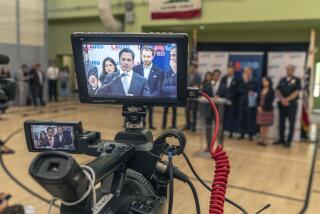Internet Can Help Teachers Reach Students
- Share via
Michael Schrage’s well-written articles on technology are always intriguing because they examine the unexamined side of social impacts, or they debunk the conventional wisdom of the role technology might serve in the future.
After reading halfway through “The Networks of Educational Hell Are Wired With Good Intentions” (Oct. 8), however, I had already composed half of this letter. I am neither a politician nor an iconoclastic college professor, but a common classroom English teacher in California, trying to make sense and use out of the “Networks of Educational Hell.” I believe the public school system would be improved with classroom access to the Internet for a variety of reasons.
One of the many current mandates for teachers is to make classroom learning “relevant.” English students, myself included, have always asked why they have to study the likes of “Beowulf,” and teachers must have an answer before the lesson continues. It is my opinion that some part of classical literature along with basic English skills are still important, but they have to be taught in an interesting way and one in which students can gain insight into current or future problems they and our society may have. If our society is wrapped up in issues of censorship on the Internet, selling products or ideas globally, communicating in a global yet individualistic arena, then this should be discussed in the classroom as well as the classics. If teachers aren’t using the Internet, will these topics be as readily discussed?
Also, teachers’ customers, students, come from a technologically advancing world. Is a student coming from a world of interactive computers, Nintendos, instantly available special-effect movies and virtual reality arcades going to change when he sits down at a desk with pencil, paper, a tome of a textbook and the teacher at the podium? Visit any identical classroom and you will see what happens. On the other end, these students will be all too soon our future citizens, parents, taxpayers and welfare supporters. Having access to the Internet will help teachers develop more interactive, useful lessons.
In response to Schrage’s criticism that schools in the past haven’t demanded access to evolving technologies, the answer is maybe they should have. I use the VCR in my curriculum now, and would have used an individual instruction format if anyone would have developed that, but there is little economic incentive for companies to develop educational applications. Also, public education is reactionary rather than innovative in this area.
The Internet was adapted by educators, but it wasn’t until businesses started using e-mail, Web sites, etc. that most of us realized how it could be used. However, even the first few telephone users could only call the other few people with phones. We can never predict even now how the Internet will be used, but let classroom teachers and their students participate in this evolution by not denying us access.
Public education is not market-driven as businesses are, with higher salaries for better teachers. Most teachers understand this very early in their careers and strive to deliver high-quality instruction for other reasons. However, teachers are human, experience high and low morale, and being involved with and connected to and adding to sentient, current issues via the Internet is a great morale booster.
Last, but not least, is public education’s age-old responsibility to provide an equalizing force--helping the downtrodden to realize the “American Dream.” The philosophy behind the Internet’s use has always been one of open access, not limited access. Those students without computers or e-mail may learn about it at school. If they don’t have even exposure, how heavily will a class of technologically illiterate adults weight us down in the future? Now is the time to consider that.
Support public education’s access to the Internet, and students’ instruction will be more impelling, relevant and the product will be adults who can better compete in the world, as well as add to its body of knowledge.
BONNIE SPRAGUE
Walnut






